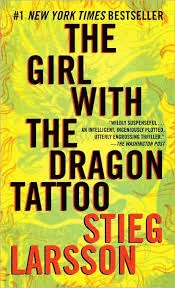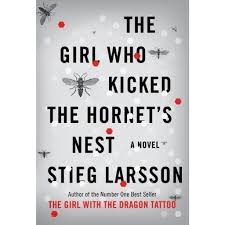The Girl in the Spider's Web: a review, no spoilers
/A bit of history: the Millennium trilogy
Did y'all read The Girl With the Dragon Tattoo and/or any of the subsequent two works in Swede Stieg Larsson's Millennium trilogy? I loved and devoured each book (the final two being The Girl Who Played With Fire and The Girl Who Kicked the Hornet's Nest) and waited with baited breath for the Swedish films staring Noomi Rapace (who brilliantly portrayed troubled, punk, genius hacker Lisbeth Salander) and Michael Nyqvist (a perfect Mikael Blomkvist, a Swedish journalist).*
What did I love so much about these books? Where do I start?!
The entertainment value is off the charts. Are Larsson's books National Book Award winners? No, probably not. Do they hook you early and keep you racing through the pages, one after another into the wee hours of the night? Yes. Emphatically yes!
In the vein of top-notch Swedish crime writing, the books in the Millennium trilogy are well-written and suspenseful and the characters complex and well developed. Full of fault and foible but also brimming with courage and authenticity, the protagonists, primarily Lisbeth Salander and Mikael Blomkvist, are characters that you can't help but love and root for. The antagonists are sordid and gross, individuals who are sick, weak or who've sold their souls in a lusty chase for power or revenge.
But their match-ups are never simplistic, dull black-and-white affairs. On the contrary, you often hang by a chilling thread.
Larsson, a Swedish journalist who focused on right-wing extremism, wrote these books in his spare time. Just before his untimely death in 2004 from a heart attack at the age of 50, he apparently reached out to several publishers. The Millennium trilogy was published posthumously, starting with The Girl With the Dragon Tattoo (Larsson's title in Swedish was, simply, Men Who Hate Women) in 2005. It quickly became a worldwide sensation, and the third in the trilogy, The Girl Who Kicked the Hornet's Nest, was the most-sold book in America in 2010.
The Girl in the Spider's Web
After Larsson's death, his widow (by Swedish common law) and his father and brother (with whom, it's purported, he was somewhat estranged) disagreed vehemently about who had rights to Stieg's work, that already published and that found in his files.
Discovered was what many consider the next book in the Millennium series. But this outline is not what Swedish journalist and crime writer, David Lagencrantz, uses as the foundation for his attempt to carry on the Millennium series: The Girl in the Spider's Web. Indeed, Lagercrantz did not have the blessing of Larsson's widow, Eva Gabrielsson, but only that of Larsson's father and brother.
In any case, as soon as I saw that Lagercrantz's book was out (via the Sunday New York Time's book review), I ordered it. Nervously but enthusiastically.
If you bothered to read Scarlett, the sequel (that word in this context drips off my lips with disdain and dramatic air quotes) to Gone With the Wind, you will fully understand my nervous skepticism about Spider's Web. Hell, if you loved Raiders of the Lost Ark and were sure that your memory that The Temple of Doom was horrible beyond belief was wrong and so watched it again to check yourself, only to find that you again wasted two hours of your life, you will also get my worry that Lagercrantz's effort would fall terribly short.
Two days after placing my order, I ripped open the just-delivered Amazon box and jumped in. One hour ago, not a week after said box-ripping, I finished the book.
I am so sad to have done so. While Lagercrantz's understanding of Lisbeth Salander seems incomplete, his portrayal of her disappointingly unfamiliar in some respects, and several elements of this story entirely too neat and tidy, Spider's Web is, overall, a fine continuation of Larsson's trilogy.
I had trouble putting it down, missed it when I wasn't obsessively reading, fell back in love with Blomkvist, and was on the edge of my bed more than three times. We meet an important character who's only mentioned via memory in the previous books, and we learn a good deal more about Salander's tortured past than Larsson shared.
Salander is not the main character in this book. Instead, Blomkvist takes center stage, perhaps because Lagercrantz has a better feel for him. The Larsson to Lagercrantz transition in writing Blomkvist is the most seamless element of Spider's Web, in my opinion. Lagercrantz's new characters are, for the most part, well-developed as were Larsson's which is a proud feature of Scandinavian crime writing as I understand it.
I didn't find this book as bullet-proof and tight as Larsson's, and the Knopf print-run from which my copy came had at least three typos which always drives me bonkers. But overall, I fully enjoyed living with the indomitable Lisbeth Salander and the sexily imperfect yet honorable Blomkvist for a few days more.
I won't be disappointed if a fifth book is offered to us sometime in the near'ish future.
*If you don't want to read the books but do want to know the stories, please DO NOT under any circumstance see the American cinematic effort in which Rooney Mara and Daniel Craig attempted but failed to inhabit the rich characters of Salander and Blomkvist. You must, instead, see the Swedish films which are brilliant and subtitled.




